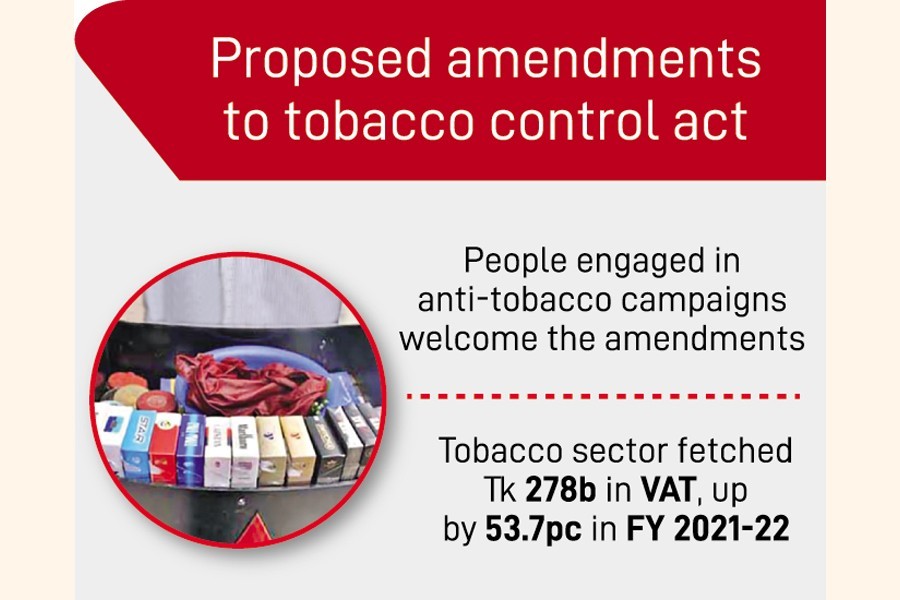The move to further amend the Smoking and Tobacco Products Usage (Control) Act of 2005 (Amended in 2013) has evoked mixed reaction.
Stakeholders concerned believe that the adoption of the proposed amendments by Parliament would hit the largest tax revenue-paying industry hard, The tobacco industry pays around Tk 300 billion in value added tax (VAT) annually to the national exchequer.
But people engaged in anti-tobacco campaigners, however, have welcomed the amendments, saying if adopted, those would go a long way to cut tobacco consumption in the country.
Though the proposed amendments of the Act aim at reducing tobacco consumption, many including economists and businesses feel otherwise.
Instead of lowering consumption, it will affect the revenue earning of the country, and will boost illegal trade of spurious tobacco products, economist Dr Ahsan H Mansur told the FE.
Many clauses of the proposed Act are not only impractical but also harmful for the economy, Dr Mansur, also the executive director of the Policy Research Institute opined.
The government should concentrate on creating awareness against tobacco consumption, rather than harming a legally-run industry, he added.
He felt that the proposal to bring the street vendors under registration will reduce the sale of the top brands but will promote the sale of low-cost and spurious brands.
The thousands of street vendors, who sell cigarette across the country, cannot be brought under enforcement and they will carry on their operation. Since these vendors will not get the supply of top brands produced by the multinational tobacco companies they will sell low-quality brands of the local companies that are least interested in complying with rules and regulations.
Asked, why MNCs will not sell their products through vendors, Dr Mansoor said, the reason is very simple- due to their corporate policies the MNCs will never be non-compliant.
Terming the proposed Act illogical under the present context, he said, at a time when economic recession looms large across the world, why the government should pass a law that would surely hit its top revenue earning sources.
He also suggested raising tax on lower segments of cigarettes.
Talking to the FE, Professor Syed Ferhat Anwar of the Institute of the Business Administration of the University of Dhaka also said that the government policy to impose more tax on higher segments and lesser tax on cheap tobacco products like bidi is not acceptable.
Professor Anwar said that reduction of tobacco consumption is necessary for ensuring health security, and that is why he is opposed to the policy not hiking the tax on lower segments which contain higher volume of tar and nicotine.
"I am an anti-tobacco man and I believe that we have to be prepared for a time when tobacco revenue would be nil" he said.
The industry insiders said that the passage of the proposed Act will bring about catastrophe to the sector, on which provides livelihood for over 8 million.
In the last fiscal year, the sector contributed TK 278 billion in VAT and this is 53.7 per cent of the total VAT revenue mobilised by the NBR.
They felt that after the enactment of the existing law- Smoking and Tobacco Products Usage (Control) Act of 2005 (Amended in 2013) - tobacco consumption is believed to have reduced. The World Bank data suggests that the tobacco usage incidence in the country fell from 44 per cent in 2010 to 34.7 per cent in 2022.
A spokesperson of a leading tobacco company said, "Section 6 of the proposed amendment refers to mandatory retail licensing for tobacco products. This may seem progressive to some but in reality, implementing such a licensing system will be a difficult task. Most retailers numbering about 1.5 million people, selling these products are owners of marginal businesses with very little amount of capital. More often than not, these are unstructured outlets with no holding numbers for their establishment".
But the anti-tobacco activists said that they do not believe that the licensing of the tobacco vendors will create any problem.
The industry people are opposing this to protect their business, several anti-tobacco activists told the FE but they declined to be named.
"We have taken a policy not to say anything about the proposed act in the media as we believe that it is a good initiative to reduce tobacco consumption" convenor of a leading anti-tobacco NGO told the FE.
We surely know that tobacco consumption is harmful to health so there should not be any debate on the issue.
However he said elimination of tobacco would be carried out in phases.
Another activist of an anti-tobacco NGO felt that banning the sale of cigarette by single stick would help reduce the tobacco consumption.
"If sales of a single stick continues than even children would have an easy access to tobacco. But when one has to buy at least one packet, they will be discouraged" he observed.
Recently, speakers at a meeting organised by the National Association of Small and Cottage Industries of Bangladesh (NASCIB) expressed their opposition to the provision of the Tobacco Control Act amendment that would require small and marginal dealers to obtain licenses in order to conduct business.
"If this amendment is enacted, approximately 1.5 million marginal and low-income shopkeepers in the country will face terrible hardships" they told the meeting. The number of dependents on the shopkeepers is between 7.0 and 8.0 million.
There is also opposition to the provision of barring the tobacco companies from CSR activities, mentioned in the amendment.
When the government is actively promoting CSR initiatives as means of public-private partnership to achieve the all-important UN Sustainable Development Goals (SDGs), such a prohibition is impractical, Dr Mansur said.


